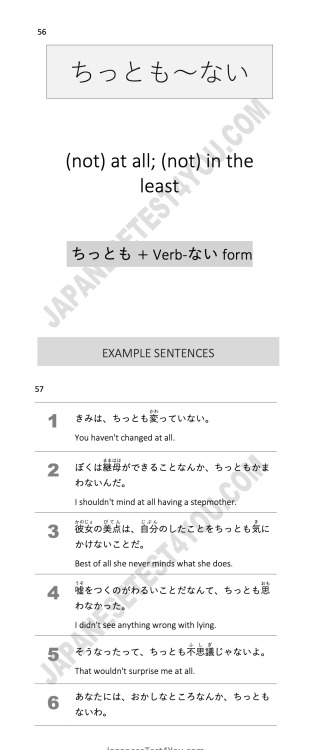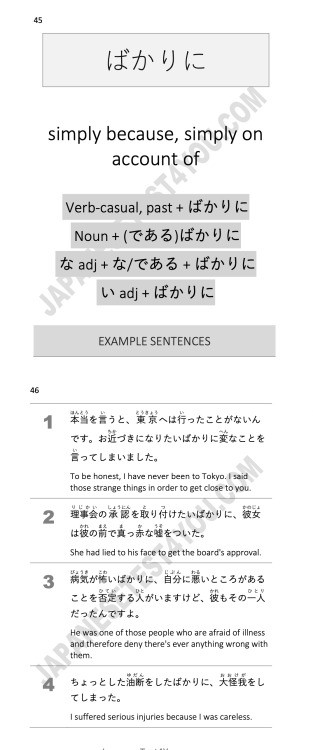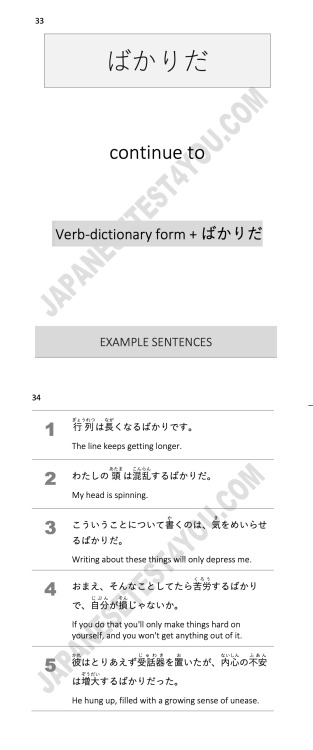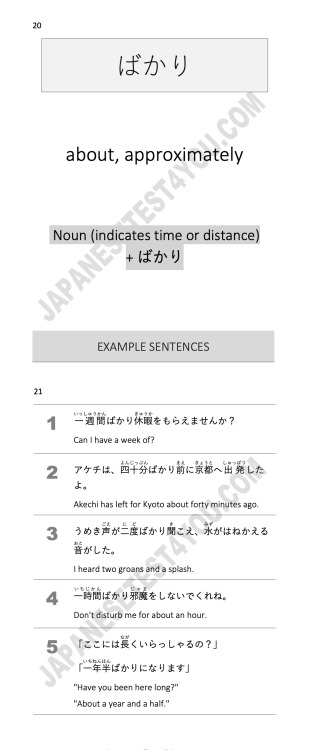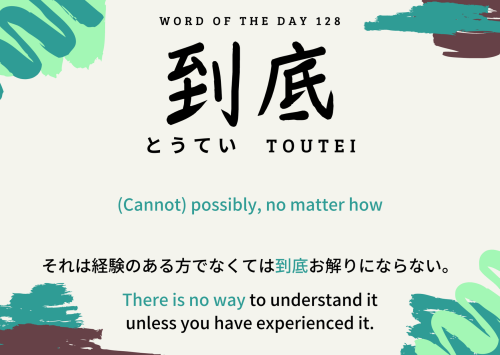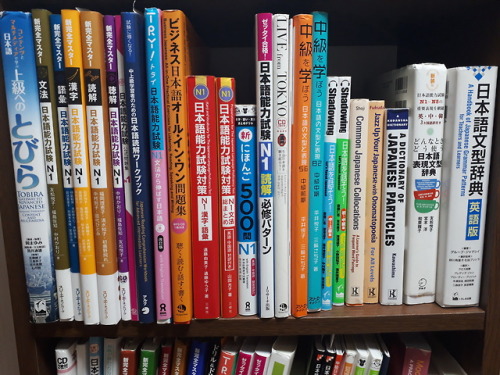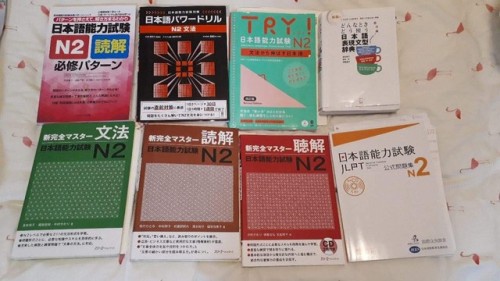#jlpt n2
JLPT Level: N1, and the kanji are N3 and N2 respectively.
Wow, two words that are on the JLPT in a row. Am I losing my edge?
Let’s break down the kanji:
到
On-yomi: tou
Kun-yomi: ita.ru
Meaning: arrival, proceed, reach, attain, result in
底
On-yomi: tei
Kun-yomi: soko
Meaning:bottom, sole, depth, bottom price, base, kind, sort
So we can put these two kanji together to get the literal meaning of “reaching the bottom.” How does that come to mean “cannot possibly,” or “no matter how”?
Well, I did some expert googling but was unable to find anything. :(
My personal opinion, though, is that it’s either of two things:
- “I am certain to the bottom of my heart that this is impossible.”
- Even if you reach down within yourself and do your best, it is impossible.”
Those are just guesses, and I’m not a native speaker, but that’s my take.
Post link
JLPT N2 Grammar - 逆に
Are you using it right??
In this episode we look at 逆に - previously used as intended to indicate opposites, but now used freely by the younger generation to mean basically anything…
————-
Welcome to Benkyogo!
In our ぶんぽうご Real Japanese Grammar series, Nani and Mani are deep diving into the textbook grammar required for the JLPT, throwing out the stuff you’ll never use, and teaching you how to speak authentically whilst expressing your own personality.
⭕️ You WILL:
- Understand grammar in real life context- Be told when and where to forget the BS - Get to listen to 2 random people free-talking about Japanese grammar
❌ You WON’T:
- Sound boring when talking to your Japanese friends - Say anything rude to your Japanese boss - Speak like you’re fresh outta your favourite anime
We don’t claim to be experts, we’re just 2 Japanese speakers (one native, one second language) chatting about the DO’s and DON’T’s of Japanese grammar in the 21st century. Keep up, textbooks!!
————-
Check out https://benkyogo.co.uk/for detailed hints, tips and resources to self-study Japanese.
⛩Check out our store at https://www.etsy.com/shop/benkyogo
JLPT N1 Grammar - までだ
Are you using it right??
I was just kidding!! Or was I? Find out about the difference between までだ and だけだ in our 20th Episode of Bunpogo!
————-
Welcome to Benkyogo!
In our ぶんぽうご Real Japanese Grammar series, Nani and Mani are deep diving into the textbook grammar required for the JLPT, throwing out the stuff you’ll never use, and teaching you how to speak authentically whilst expressing your own personality.
⭕️ You WILL:
- Understand grammar in real life context- Be told when and where to forget the BS - Get to listen to 2 random people free-talking about Japanese grammar
❌ You WON’T:
- Sound boring when talking to your Japanese friends - Say anything rude to your Japanese boss - Speak like you’re fresh outta your favourite anime
We don’t claim to be experts, we’re just 2 Japanese speakers (one native, one second language) chatting about the DO’s and DON’T’s of Japanese grammar in the 21st century. Keep up, textbooks!!
————-
Check out https://benkyogo.co.uk/for detailed hints, tips and resources to self-study Japanese.
⛩Check out our store at https://www.etsy.com/shop/benkyogo
JLPT N2 Grammar - ちなみに
Are you using it right??
Challenge yourself with JLPT N2 and the difference between ちなみに and とにかく. We find out which means what and – can I change the subject now?
————-
Welcome to Benkyogo!
In our ぶんぽうご Real Japanese Grammar series, Nani and Mani are deep diving into the textbook grammar required for the JLPT, throwing out the stuff you’ll never use, and teaching you how to speak authentically whilst expressing your own personality.
⭕️ You WILL:
- Understand grammar in real life context- Be told when and where to forget the BS - Get to listen to 2 random people free-talking about Japanese grammar
❌ You WON’T:
- Sound boring when talking to your Japanese friends - Say anything rude to your Japanese boss - Speak like you’re fresh outta your favourite anime
We don’t claim to be experts, we’re just 2 Japanese speakers (one native, one second language) chatting about the DO’s and DON’T’s of Japanese grammar in the 21st century. Keep up, textbooks!!
————-
Check out https://benkyogo.co.uk/for detailed hints, tips and resources to self-study Japanese.
⛩Check out our store at https://www.etsy.com/shop/benkyogo
JLPT N5 Grammar - だろう
Are you using it right??
In this episode we tackle the differences between でしょう, だろう(ね),and だろ and look into gender differences in Japanese speech.
————-
Welcome to Benkyogo!
In our ぶんぽうご Real Japanese Grammar series, Nani and Mani are deep diving into the textbook grammar required for the JLPT, throwing out the stuff you’ll never use, and teaching you how to speak authentically whilst expressing your own personality.
⭕️ You WILL:
- Understand grammar in real life context- Be told when and where to forget the BS - Get to listen to 2 random people free-talking about Japanese grammar
❌ You WON’T:
- Sound boring when talking to your Japanese friends - Say anything rude to your Japanese boss - Speak like you’re fresh outta your favourite anime
We don’t claim to be experts, we’re just 2 Japanese speakers (one native, one second language) chatting about the DO’s and DON’T’s of Japanese grammar in the 21st century. Keep up, textbooks!!
————-
Check out https://benkyogo.co.uk/for detailed hints, tips and resources to self-study Japanese.
⛩Check out our store at https://www.etsy.com/shop/benkyogo
JLPT N1 Grammar - こそすれ
Are you using it right??
How did the JLPT go for you? If, like Nani, you feel like you failed miserably… we’re still here to help you for next Summer. In this episode we take a look at the JLPT N1 grammar こそすれ and find out more about Nani’s cat.
————-
Welcome to Benkyogo!
In our ぶんぽうご Real Japanese Grammar series, Nani and Mani are deep diving into the textbook grammar required for the JLPT, throwing out the stuff you’ll never use, and teaching you how to speak authentically whilst expressing your own personality.
⭕️ You WILL:
- Understand grammar in real life context- Be told when and where to forget the BS - Get to listen to 2 random people free-talking about Japanese grammar
❌ You WON’T:
- Sound boring when talking to your Japanese friends - Say anything rude to your Japanese boss - Speak like you’re fresh outta your favourite anime
We don’t claim to be experts, we’re just 2 Japanese speakers (one native, one second language) chatting about the DO’s and DON’T’s of Japanese grammar in the 21st century. Keep up, textbooks!!
————-
Check out https://benkyogo.co.uk/for detailed hints, tips and resources to self-study Japanese.
⛩Check out our store at https://www.etsy.com/shop/benkyogo
JLPT N2 Grammar - どうせ
Are you using it right??
In this episode we take a look at the JLPT N2 grammar どうせ and find out what angry mums and guilty boyfriends have in common.
————-
Welcome to Benkyogo!
In our ぶんぽうご Real Japanese Grammar series, Nani and Mani are deep diving into the textbook grammar required for the JLPT, throwing out the stuff you’ll never use, and teaching you how to speak authentically whilst expressing your own personality.
⭕️ You WILL:
- Understand grammar in real life context- Be told when and where to forget the BS - Get to listen to 2 random people free-talking about Japanese grammar
❌ You WON’T:
- Sound boring when talking to your Japanese friends - Say anything rude to your Japanese boss - Speak like you’re fresh outta your favourite anime
We don’t claim to be experts, we’re just 2 Japanese speakers (one native, one second language) chatting about the DO’s and DON’T’s of Japanese grammar in the 21st century. Keep up, textbooks!!
————-
Check out https://benkyogo.co.uk/ for detailed hints, tips and resources to self-study Japanese.
⛩Check out our store at https://www.etsy.com/shop/benkyogo
JLPT N1 Grammar - ごとく・ごとく
Are you using it right??
In this episode we take a look at the JLPT N1 grammar ごとく/ごとき and what makes it different from our comfortable, 分かりやすい「のような・のように」…
————-
Welcome to Benkyogo!
In our ぶんぽうご Real Japanese Grammar series, Nani and Mani are deep diving into the textbook grammar required for the JLPT, throwing out the stuff you’ll never use, and teaching you how to speak authentically whilst expressing your own personality.
⭕️ You WILL:
- Understand grammar in real life context- Be told when and where to forget the BS - Get to listen to 2 random people free-talking about Japanese grammar
❌ You WON’T:
- Sound boring when talking to your Japanese friends - Say anything rude to your Japanese boss - Speak like you’re fresh outta your favourite anime
We don’t claim to be experts, we’re just 2 Japanese speakers (one native, one second language) chatting about the DO’s and DON’T’s of Japanese grammar in the 21st century. Keep up, textbooks!!
————-
Check out https://benkyogo.co.uk/ for detailed hints, tips and resources to self-study Japanese.
⛩Check out our store at https://www.etsy.com/shop/benkyogo
JLPT N2 Grammar - あるいは
Are you using it right??
In this episode we explore the 2 meanings of あるいは, but after all the hassle do we even use it??! Find out in 2 minutes how to say it in casual, formal and business situations.
————-
Welcome to Benkyogo!
In our ぶんぽうご Real Japanese Grammar series, Nani and Mani are deep diving into the textbook grammar required for the JLPT, throwing out the stuff you’ll never use, and teaching you how to speak authentically whilst expressing your own personality.
⭕️ You WILL:
- Understand grammar in real life context- Be told when and where to forget the BS - Get to listen to 2 random people free-talking about Japanese grammar
❌ You WON’T:
- Sound boring when talking to your Japanese friends - Say anything rude to your Japanese boss - Speak like you’re fresh outta your favourite anime
We don’t claim to be experts, we’re just 2 Japanese speakers (one native, one second language) chatting about the DO’s and DON’T’s of Japanese grammar in the 21st century. Keep up, textbooks!!
————-
Check out https://benkyogo.co.uk/ for detailed hints, tips and resources to self-study Japanese.
⛩Check out our store at https://www.etsy.com/shop/benkyogo
JLPT N3 Grammar - もしかしたら
Are you using it right??
In this episode we find out the difference between もしかしたら、 たぶん and おそらく. Find out how to use ‘maybe’ in business and casual settings in just 3 minutes!
————-
Welcome to Benkyogo!
In our ぶんぽうご Real Japanese Grammar series, Nani and Mani are deep diving into the textbook grammar required for the JLPT, throwing out the stuff you’ll never use, and teaching you how to speak authentically whilst expressing your own personality.
⭕️ You WILL:
- Understand grammar in real life context- Be told when and where to forget the BS - Get to listen to 2 random people free-talking about Japanese grammar
❌ You WON’T:
- Sound boring when talking to your Japanese friends - Say anything rude to your Japanese boss - Speak like you’re fresh outta your favourite anime
We don’t claim to be experts, we’re just 2 Japanese speakers (one native, one second language) chatting about the DO’s and DON’T’s of Japanese grammar in the 21st century. Keep up, textbooks!!
————-
Check out https://benkyogo.co.uk/ for detailed hints, tips and resources to self-study Japanese.
⛩Check out our store at https://www.etsy.com/shop/benkyogo
JLPT N1 Grammar - きらいがある
Are you using it right??
In this episode we take a look at the JLPT N1 grammar ‘きらいがある’. It’s easy enough to understand, but when you use it in real life are people shocked? We find out that not all N1 grammar is used in daily life, in fact most of it is worth forgetting… There are no Japanese subs in this video, as by N1 level you are expected to understand the content. But feel free to press CC for English subs during the tricky bits!
————-
Welcome to Benkyogo!
In our ぶんぽうご Real Japanese Grammar series, Nani and Mani are deep diving into the textbook grammar required for the JLPT, throwing out the stuff you’ll never use, and teaching you how to speak authentically whilst expressing your own personality.
⭕️ You WILL:
- Understand grammar in real life context- Be told when and where to forget the BS - Get to listen to 2 random people free-talking about Japanese grammar
❌ You WON’T:
- Sound boring when talking to your Japanese friends - Say anything rude to your Japanese boss - Speak like you’re fresh outta your favourite anime
We don’t claim to be experts, we’re just 2 Japanese speakers (one native, one second language) chatting about the DO’s and DON’T’s of Japanese grammar in the 21st century. Keep up, textbooks!!
————-
Check out https://benkyogo.co.uk/ for detailed hints, tips and resources to self-study Japanese.
⛩Check out our store at https://www.etsy.com/shop/benkyogo
JLPT N2 Grammar - ということで
Are you using it right??
In this episode we take a look at the JLPT N2 grammar ‘ということは’. It’s a great phrase when you want to confirm what someone just said, or ask a question about some missing information. There are no Japanese subs in this video, as by N2 level you are expected to understand the content. But feel free to press CC for English subs during the tricky bits!
————-
Welcome to Benkyogo!
In our ぶんぽうご Real Japanese Grammar series, Nani and Mani are deep diving into the textbook grammar required for the JLPT, throwing out the stuff you’ll never use, and teaching you how to speak authentically whilst expressing your own personality.
⭕️ You WILL:
- Understand grammar in real life context- Be told when and where to forget the BS - Get to listen to 2 random people free-talking about Japanese grammar
❌ You WON’T:
- Sound boring when talking to your Japanese friends - Say anything rude to your Japanese boss - Speak like you’re fresh outta your favourite anime
We don’t claim to be experts, we’re just 2 Japanese speakers (one native, one second language) chatting about the DO’s and DON’T’s of Japanese grammar in the 21st century. Keep up, textbooks!!
————-
Check out https://benkyogo.co.uk/ for detailed hints, tips and resources to self-study Japanese.
⛩Check out our store at https://www.etsy.com/shop/benkyogo
Welcome to Benkyogo!
————-
In our ぶんぽうご Real Japanese Grammar series, Nani and Mani are deep diving into the textbook grammar required for the JLPT, throwing out the stuff you’ll never use, and teaching you how to speak authentically whilst expressing your own personality.
⭕️ You WILL:
- Understand grammar in real life context
- Be told when and where to forget the BS
- Get to listen to 2 random people free-talking about Japanese grammar
❌ You WON’T:
- Sound boring when talking to your Japanese friends
- Say anything rude to your Japanese boss
- Speak like you’re fresh outta your favourite anime
We don’t claim to be experts, we’re just 2 Japanese speakers (one native, one second language) chatting about the DO’s and DON’T’s of Japanese grammar in the 21st century. Keep up, textbooks!!
————-
Check out https://benkyogo.co.uk/ for detailed hints, tips and resources to self-study Japanese.
⛩Check out our store at https://www.etsy.com/shop/benkyogo
What is the JLPT? 日本語能力試験: Ultimate Guide to the Japanese Language Proficiency Test
Example Questions (official site): https://www.jlpt.jp/e/samples/forlear…
What is the Kanji Kentei?: https://www.youtube.com/watch?v=HEl5N…
Benkyogo Store: https://www.etsy.com/uk/shop/Benkyogo
Instagram: @benkyogo
Welcome to Benkyogo!
- - - - - - - - - - - - - - - - - - - - -
Links mentioned in this video
日本語単語スピードマスター Textbook: https://tinyurl.com/yxtunjay
Benkyogo Blog Post: https://benkyogo.co.uk/?p=2407
Benkyogo Store: https://www.etsy.com/uk/shop/Benkyogo
- - - - - - - - - - - - - - - - - - - - - -
⛩ Visit Benkyogo.co.uk for more ways to learn Japanese!
https://www.benkyogo.co.uk/
Alright, now that I’m done failing the N2 again I have some time to post and boy do I have a mountain of notes and comparisons. So today, I will be talking about ~てたまらない、~てならない、and ~ないではいられない which all have similiar meanings.
- ~てたまらない means “ dying to do; unbearably” This is used with verbs and adjectives (Vて/イAdjくて/ナAdjで) This for strong feelings or physical sensations. If your subject in is the 3rd person, you must use ようだ、らしい、or のだ at the end of the sentence.
- 日本に来て友達ができるまでは、国に帰りたくてたまらなかった。
- 風邪薬を飲んだから、眠くてたまらない。
- うちの子供は試合に負けたのがくやしくてたまらないようです。
- ~てならない means “can’t help but” This is used with verbs and adjectives (Vて/イAdjくて/ナAdjで )When you cannot suppress emotions or physical sensations that naturally arise. Often used to indicate a state of mind that cannot be suppressed and results in a highly emotional condition. This often expresses negative feelings. This must also use ようだ、らしい、or のだ at the end of the sentence when in 3rd person.
- 将来がどうなるか、不安でならない。
- 子供のころピーマンを食べるのがいやでならなかった。
- 彼は希望の大学に入れなくて、残念でならないのだ。
- ~ないではいられない and also seen as ~ずにはいられない means “can’t resist; can’t not do” This is only used with verbs in the ~て form. Used to express something that the speaker sees and cannot overcome the strong feeling of wanting to do something about it. It’s important to know that this is not because speaker cannot control themself and is forced, but rather than it’s done spontaneously. This must also use ようだ、らしい、or のだ at the end of the sentence when in 3rd person.
- その映画を見た人はみんな、泣かないではいられないだろう。
- 動物園のサルを見ると、いつも私は笑わないでいられない。
- 言わないほうがよいことは分かっているが、話さないではいられなかった。
In conclusion, ~てたまらない is “dying to do something/unbearable” if the heat is unbearable or you’re dying to meet someone, ~てならない is “can’t help but (doing/feeling)” if you can’t help but feeling disappointed by your test score or someone can’t help feeling sad after some bad news, and ~ないではいられない is “can’t not do something” like if Beyoncé releases a new album you can’t NOT listen to it
I hope this helps, please let me know if you have any questions!
queenofglitcheslearnsjapanese:
Adverbs are easily the hardest part of learning new vocabulary for me. They can completely alter the meaning of a sentence but they just slip from my mind so easily, I often need to read them in a wide variety of sentences before the meaning will stick in my head. Very occasionally, they will just stick but more often than not, I’ll end up having to look it up despite knowing I’ve seen it before. A giant list is probably not the most useful way of presenting these, but I intend to use this as a basis for an Anki deck, which should hopefully get some of these to finally stick in my head.
Starting with ones that I can remember without any trouble (finally):
まるで-quite, entirely, as if, as though
わざと-on purpose
一切-いっさい-all, everything, the whole
ようやく-finally, at last
いつの間にか-いつのまにか-before one knows it
一応-いちおう-roughly, somewhat, once, tentatively, just in case
ひょっとする-perhaps, maybe, possibly
既に-すでに-already, too late
何とか-なんとか-something or other, so-and-so
必死に-ひっしに-frantically, desperately
早速-さっそく-at once, immediately
そのまま-without change, as it is
めったに-rarely, seldom (used with verbs in negative form)
万一-まんいち-by some chanceNext, ones that either take me a couple of seconds to remember or that I can work out the meaning of:
改めて-あらためて-another time, again, over again
中でも-なかでも-among (other things)
近々-ちかぢか-soon, before long
はるかに-far off, in the distance, long ago
案外-あんがい-unexpectedly
自ら-みずから-for one’s self, personally
よほど-very, greatly
当分-とうぶん-for the present, currentlyAnd finally, a whole load of adverbs that just won’t stay in my head.
ちっとも-not at all (used with verbs in negative form)
めっきり-remarkably
まさに-exactly, surely, certainly
思い切って-おもいきって-resolutely, boldly, daringly
しきりに-frequently, repeatedly, often
かえって-on the contrary, rather, instead
あらかじめ-beforehand, in advance, previously
ぐっと-suddenly, at once, in one go
たちまち-at once, in a moment, suddenly
今に-before long, even now
わずか-only, merely
実に-じつに-indeed, really, absolutely
ぼんやり-dimly, faintly, vaguely
一段と-いちだんと-more, much more
決まって-きまって-always, without fail, usually
ひとまず-for the present, once, in outline
次第に-しだいに-gradually
せっせと-diligently, industriously
必ずしも-かならずしも-(not) always, (not) necessarily, (not) entirely
じっくり-deliberately, carefullyThis isn’t the full list of adverbs that are needed at N2 level, just the ones I picked out from maybe the first fifth of my book. There’s still many more that I struggle to remember, including all the ones that include 今, so you can probably expect another list like this at some point.
Bookshelf update. Donated most N3 and lower level books/N2 books I hadn’t really used. Trying not to clutter up my shelf with books I don’t use. However, I should not be let into a bookstore unsupervised because I can’t leave without buying another book…
If you want to know about any of these textbooks, let me know!
Post link
Should have posted this earlier, but these books helped me the most with passing N2 in July. Hope this helps if you’re unsure of which language books you want to use
Post link
かねる is a piece of grammar that you will find littered in N2 material. This can be confusing sometimes as you’re about to see, but hang in there and we’ll get through this!
- Verb stem + かねる means “cannot deal with” / できない . This is when something is difficult or impossible to do.
- お客様の個人情報は、教えかねます。
- 残念ながら、そのご提案はお受けいたしかねます。
- 彼は留学生活の寂しさに耐えかねて、1年もたたないうちに帰国してしまった。
- Verb stem + かねない means “could”/かもしれない .Used when something that the speakers evaluates as negative might occur.
- そんな乱暴な運転をしたら事故を起こしかねないよ。
- 保護しないと、この種は絶滅しかねない。
- 風邪だからといって放っておくと、大きい病気になりかねない。
- ~をかねる For this last version pay attention that the particle を will precede the verb, also written as 兼ねる with its kanji. This is used to express that one thing serves as two or more functions simultaneously.
- サラさんの送別会をかねて、クラスで懇親会を開いた。
- 休日の朝は平時より遅く起きて、朝食と昼食を兼ねた食事をとる。
- 私は勉強と遊びを兼ねている仕事に就きたい。
I know with かねる and かねない it’s very hard to remember which is which because one means できない and the other means かもしれない . The trick I have when I can’t remember isn’t necessarily a great one, but it works for me.

If you line up かねる and its meaning できない like I did, there is one extra letter い that doesn’t line up. Using that extra letter I then remember it as, “I ( い) can’t do it.” Again, is this a dumb method? Yes. Does it work if you are doing a test/practice test/practice questions and you can’t for the life of you remember which one is which? Also yes.
I hope this helps, please let me know if you have any questions!



